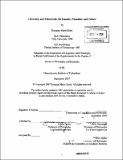Liberalism and ethical life : on equality, neutrality, and culture
Author(s)
Kurtz, Roxanne Marie
DownloadFull printable version (9.977Mb)
Other Contributors
Massachusetts Institute of Technology. Dept. of Linguistics and Philosophy.
Advisor
Joshua Cohen and Sally Haslanger.
Terms of use
Metadata
Show full item recordAbstract
Liberalism faces an apparent paradox. Its commitments to values such as neutrality and tolerance seem to recommend a hands-off attitude toward a society's ethical life. It seems the state should not regulate the value systems that underlie a society's ethos, group interests, or individual lives. Yet plausible sociological claims suggest that to respect liberal values, the state should interfere with ethical life. So, liberal justice appears to recommend sharply conflicting attitudes to ethical life. In three chapters, I argue that liberalism should adopt a limited hands-on attitude toward ethical life that avoids the apparent paradox.In the first chapter, "Meanness, generosity, and Rawlsian distributive justice," I contend that the liberal state should shape ethical life to respect the value of equality. A hands-off attitude blinds the state to its effects on the market ethos. These effects can interfere with distributive justice-e.g., if the ethos is marked by extreme greediness. A state that attends to its effects on ethical life may promote less greed and thereby a more just distribution.In the second chapter, "Examining the hoopla over opera: liberal neutrality as justified interference," I argue for liberal neutrality as neutrality of justified interference. This view permits constrained interference with ethical life, but permits no interference that is itself inadequately justified. (cont.) I reject two other approaches: neutrality of justifications, which does not hold the state accountable for its interference with ethical life, and neutrality of interference, a consequentialist view that requires the state maintain a status quo with respect to ethical life. In the third chapter, "Confessions of an army brat-an outsider's insight into liberal egalitarianism multiculturalism," I suggest liberalism should better respect the value of culture. The problem is practical-it is difficult to appreciate and weigh both the value of cultural belonging and the threat that the state's interference with ethical life poses to cultures. A hands-off attitude toward ethical life allows too much interference with cultures, while too little interference conflicts with justice. Thus I propose a liberal multiculturalist principle that places the priority of culture (presumptively) above many secondary goods but below liberty and equality.
Description
Thesis (Ph. D.)--Massachusetts Institute of Technology, Dept. of Linguistics and Philosophy, February 2008. Includes bibliographical references (leaves 139-148).
Date issued
2008Department
Massachusetts Institute of Technology. Department of Linguistics and PhilosophyPublisher
Massachusetts Institute of Technology
Keywords
Linguistics and Philosophy.